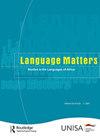Attitudes of Nigerians Towards BBC Pidgin: A Preliminary Study
IF 0.8
3区 文学
0 LANGUAGE & LINGUISTICS
引用次数: 0
Abstract
Abstract Despite their increased functional load and widespread usage, no West African Pidgin English (WAPE) variety enjoys official recognition. In 2017, the BBC launched a Pidgin news service targeting the West African audience through its World Service branch in Nigeria. Now that WAPE is being promoted by the BBC, it remains to be known what attitudes speakers of WAPE varieties hold towards Pidgin in general and BBC Pidgin in particular. This study investigates the attitudes of Nigerian respondents towards the emergence of BBC Pidgin and their perception of Nigerian Pidgin, using the interview-questionnaire approach. The findings show that, generally, respondents have positive attitudes towards Nigerian Pidgin and BBC Pidgin. However, their attitudes towards considering using either of the two varieties for official purposes in Nigeria were generally negative, claiming that BBC Pidgin differs from the pidgin variety they use, especially with regard to its orthography and vocabulary.尼日利亚人对BBC Pidgin的态度初探
摘要尽管西非洋泾浜英语(WAPE)的功能负荷增加,使用范围广泛,但没有一种得到官方认可。2017年,英国广播公司通过其在尼日利亚的世界服务分部推出了一项面向西非观众的Pidgin新闻服务。既然WAPE正在由英国广播公司推广,那么WAPE品种的演讲者对洋泾浜的总体态度,尤其是对英国广播公司的洋泾浜持什么态度,还有待了解。本研究采用访谈问卷法调查了尼日利亚受访者对BBC Pidgin出现的态度以及他们对尼日利亚Pidgin的看法。调查结果显示,总体而言,受访者对尼日利亚Pidgin和BBC Pidgin持积极态度。然而,他们对考虑在尼日利亚将这两种变体中的任何一种用于官方目的的态度普遍是负面的,声称BBC Pidgin与他们使用的洋泾浜变体不同,尤其是在拼写和词汇方面。
本文章由计算机程序翻译,如有差异,请以英文原文为准。
求助全文
约1分钟内获得全文
求助全文
来源期刊

Language Matters
Multiple-
CiteScore
1.20
自引率
0.00%
发文量
19
期刊介绍:
The purpose of Language Matters is to provide a journal of international standing with a unique African flavour focusing on multilingualism in Africa. Although the journal contributes to the language debate on all African languages, sub-Saharan Africa and issues related to multilingualism in the southern African context are the journal’s specific domains. The journal seeks to promote the dissemination of ideas, points of view, teaching strategies and research on different aspects of African languages, providing a forum for discussion on the whole spectrum of language usage and debate in Africa. The journal endorses a multidisciplinary approach to the study of language and welcomes contributions not only from sociolinguists, psycholinguists and the like, but also from educationalists, language practitioners, computer analysts, engineers or scholars with a genuine interest in and contribution to the study of language. All contributions are critically reviewed by at least two referees. Although the general focus remains on multilingualism and related issues, one of the three issues of Language Matters published each year is a special thematic edition on Language Politics in Africa. These special issues embrace a wide spectrum of language matters of current relevance in Southern Africa.
 求助内容:
求助内容: 应助结果提醒方式:
应助结果提醒方式:


